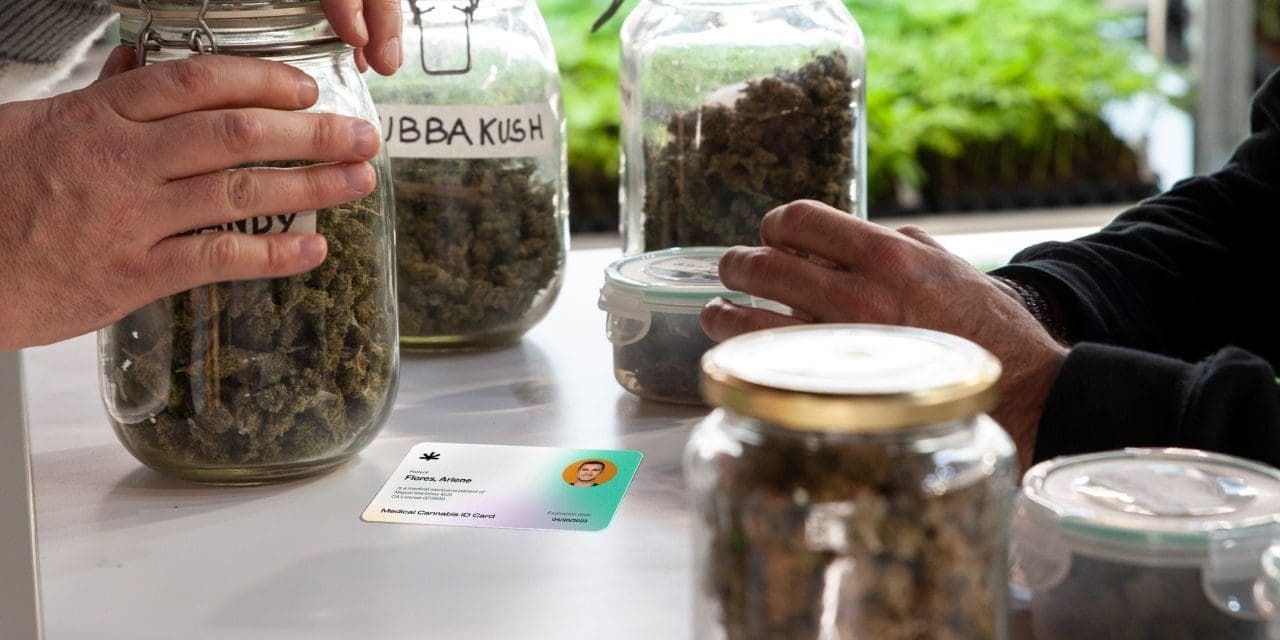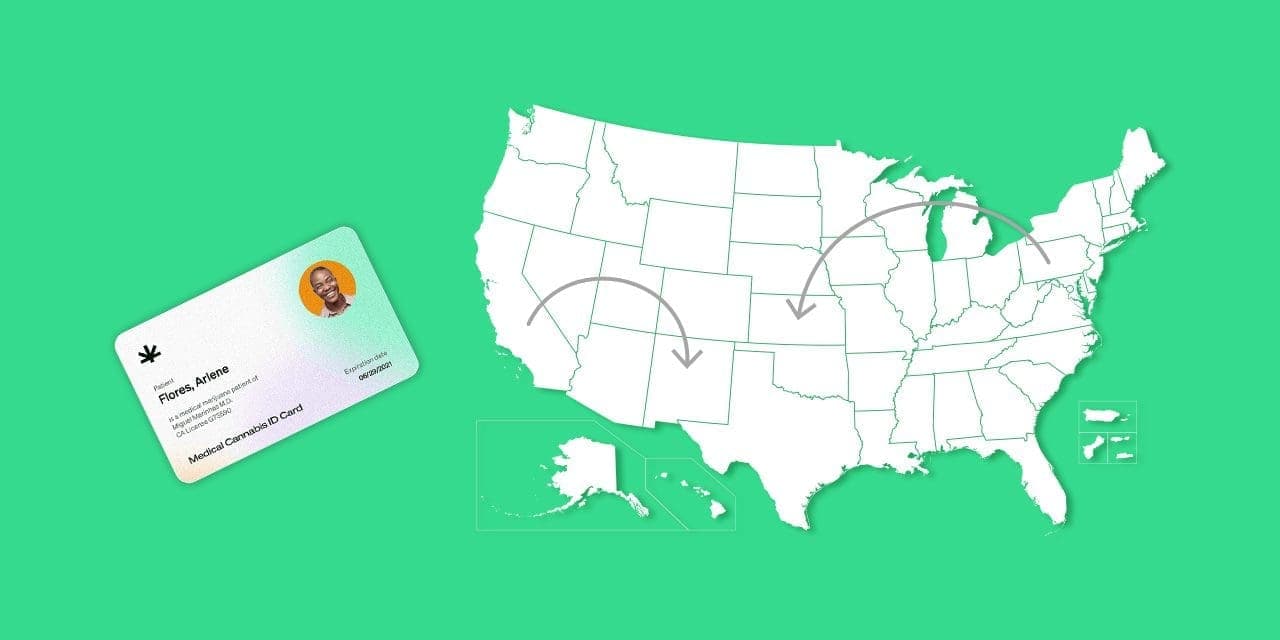How Much Weed Can I Buy With My Medical Card?

Article written by

Jordan WoldSEO Content Writer
Content reviewed by

Dr. Gavin MorelandMedical Director
With marijuana laws so different from one state to another, it can be stressful to ensure you’re following your state’s laws to the letter.
While the sometimes arbitrary-seeming disparity between differing legislation might be a source of mild irritation for recreational marijuana users, it can be an overwhelming, unnecessary burden for medical patients who want to use cannabis to treat medical conditions without breaking laws.
One of the most important questions many patients may have is exactly how much marijuana or cannabis products they can buy with their medical card.
The amount differs from state to state, but generally speaking, the amount of cannabis you can buy for medical use ranges from 1 ounce to 6 ounces.
Get Your Medical Card
States With Medical Marijuana Programs
To have a medical card in the first place, you (usually) need to have a qualifying medical condition and live in a state with a medical marijuana program.
Some exceptions exist, like Kentucky, which does not have its own medical cannabis program but does allow for medical cannabis certification for specific conditions — though qualifying patients would have to travel to an entirely different state to purchase cannabis from a dispensary.
States and territories with medical marijuana programs include:
- Alabama
- Alaska
- Arkansas
- California*
- Colorado*
- Connecticut
- Delaware
- Florida
- Georgia
- Guam*
- Hawaii
- Illinois*
- Iowa
- Louisiana
- Maine*
- Maryland
- Massachusetts*
- Michigan
- Mississippi
- Missouri*
- Montana*
- Nevada*
- New Hampshire
- New Jersey*
- New Mexico*
- New York*
- North Dakota
- Ohio
- Oklahoma
- Oregon*
- Pennsylvania
- Puerto Rico
- Rhode Island*
- South Dakota
- Texas
- U.S. Virgin Islands*
- Utah
- Vermont*
- Virginia*
- Washington*
- Washington D.C.*
Asterisks* indicate that the state or territory has recreational cannabis sales for those 21 years or older, in addition to a medical program.
There are many benefits to having a medical card, even if you live in a state with recreational marijuana.
In states where cannabis is otherwise illegal, registered patients should be shielded from possession as long as they have below the legal medical limit in their possession.
The most notable perk for getting a medical card in states with recreational cannabis is significant tax savings. In Illinois, for example, medical marijuana patients save anywhere from 15% to 30% each time they buy cannabis products.
How Much Weed MMJ Patients Can Purchase by State?
Because cannabis is still illegal under federal law, state limits for personal use may change frequently. It is essential always to keep up with your state’s current laws and limitations.
And if you travel across state lines to a state without a medical reciprocity program, you could face criminal charges, even if your initial purchase was under the personal use limit.
You should also ask your prescribing physician for help understanding the limits in your state. While it may be easy to understand what a 2-ounce limit means, it can be a bit trickier to understand what constitutes a 30, 60, or 90-day supply of cannabis.
It is also important to note that a state’s possession limit does not necessarily correlate with potency. Texas, for example, does not have a specific purchase limit for qualifying patients, but the THC content of medical cannabis must be less than 1%, according to current state guidelines.
Current limits for how much cannabis patients may purchase from a medical marijuana dispensary are:
- Alabama: 50-75mg per day
- Alaska: 1 ounce
- Arkansas: 2.5 ounces every two weeks
- California: No defined limit for medical patients. Recreational marijuana users are limited to 1 ounce or 8 grams of concentrate at a time.
- Colorado: 2 ounces of flower, 1 ounce of concentrate
- Connecticut: One month’s supply, as determined by a physician
- Delaware: 6 ounces
- Florida: 4 ounces
- Georgia: Up to 20 fluid ounces of select low-THC products that contain a maximum of 5% THC
- Guam: 2.5 ounces
- Hawaii: 4 ounces every 15 days
- Illinois: 2.5 ounces
- Iowa: 4.5 grams every 90 days
- Louisiana: 30-day supply, as determined by a physician
- Maine: 2.5 ounces
- Maryland: 120 grams of flower (4.23 ounces) or 36 grams of concentrate
- Massachusetts: 10 ounces every 60 days
- Michigan: 2.5 ounces
- Mississippi: 2.5 ounces
- Missouri: 6 ounces, although patients can be approved for larger quantities if their physician decides there is a necessary reason for doing so.
- Montana: 1 ounce
- Nevada: 2.5 ounces every 14 days
- New Hampshire: 2 ounces
- New Jersey: 3 ounces every 30 days
- New Mexico: 2 ounces
- New York: 60-day supply
- North Dakota: 3 ounces
- Ohio: 90-day supply
- Oklahoma: Patients can purchase up to 3 ounces at once with their med card but can have up to 8 ounces in their residences.
- Oregon: 24 ounces
- Pennsylvania: 30-day supply
- Puerto Rico: Consumption for medical use is limited to one ounce per day, but patients can purchase and possess up to a 30-day supply.
- Rhode Island: 2.5 ounces
- South Dakota: 3 ounces
- Texas: No defined limits, but only allowed as low-THC cannabis oil
- U.S. Virgin Islands: 4 ounces
- Utah: 56 grams, or just under 2 ounces, though patients may possess a greater amount if they live over 100 miles from the nearest dispensary
- Vermont: 2 ounces
- Virginia: 90-day supply
- Washington: 3 ounces
- Washington D.C.: 4 ounces
States That Accept Out-of-State Medical Cannabis Cards
Most medical cannabis patients are limited to participating in their residence state’s medical marijuana program. A limited number of states allow qualifying patients to obtain medical cards without being a resident, like Hawaii and California.
If you live in a state with its own medical marijuana program, a more relevant consideration would be states with medical marijuana reciprocity. States with reciprocity choose to recognize medical marijuana cards from other states, though this is not a one-size-fits-all approach.
Some states require that the visiting patient resides in a state that also has reciprocity, for example. In contrast, other states may only recognize out-of-state cards for a limited time, after which point residents may be required to apply for a new medical marijuana card.
The following states have some form of medical card reciprocity:
- Arizona
- Arkansas
- California
- Colorado
- Connecticut
- Hawaii
- Illinois
- Maine
- Maryland
- Massachusetts
- Michigan (Patients must reside in a state that has reciprocity with Michigan.)
- Missouri
- Nevada
- New Hampshire
- New Jersey
- New Mexico
- New York
- Oklahoma
- Oregon
- Pennsylvania (Only for minor patients)
- Puerto Rico
- Rhode Island
- U.S. Virgin Islands
- Utah (45-day limit, after which the patient must apply for a Utah MMJ card.)
- Vermont
- Virginia
- Washington
- Washington, D.C.
The Bottom Line
While it is unfortunate that medical marijuana patients are sometimes required to be armed with extensive knowledge of local cannabis legislation, it is important to stay up to date to avoid potential legal trouble.
If you live in a state with a medical marijuana program and have a qualifying condition, consider making an appointment with a Leafwell physician to learn more about eligibility and if medical cannabis might be right for you.


